He darted in and out of the sea-monster’s mouth. Before the sea-monster could snap her jaws shut, he had escaped far beyond her reach

Illustration/Devdutt Pattanaik
 Yagna is the primal ritual of the Veda. Mistranslated as sacrifice, it is a ritual of exchange and reciprocity. To appreciate its philosophy, we need to hear stories.
Yagna is the primal ritual of the Veda. Mistranslated as sacrifice, it is a ritual of exchange and reciprocity. To appreciate its philosophy, we need to hear stories.
This story comes from the Ramayana. A monkey was flying over a body of water when a sea-monster caught him by his shadow and swallowed him whole. The monkey used his nails and ripped his way out of the sea-monster’s belly. But then the monkey’s path was blocked by another sea-monster who widened her mouth, preventing him from going further. The monkey had no choice but to enter her mouth. The monkey, however, had a trick. He grew in size, larger and larger, too big for the sea-monster to swallow. But the sea-monster did not give up. She was able to widen her jaws even more, wider and wider. The monkey then suddenly, in the flash of an eye, reduced himself into the size of a fly. He darted in and out of the sea-monster’s mouth. Before the sea-monster could snap her jaws shut, he had escaped far beyond her reach.
ADVERTISEMENT
To survive, animals use strength and cunning. Who is the victim here, and the villain? Are there victims and villains in nature? Why do humans tend to see predators as villains, and prey as victims? In nature, there are the eaters and the eaten, the predator and the prey. In culture, predators are villains, prey are victims.
This story is found in Buddhist, Jain and Hindu lore, including the Mahabharata. A dove was chasing a hawk. The king saved the dove. The hawk asked, what will I eat now? The king offered his own body. The hawk asked, and after you die? To protect life is dharma. To deny food to the hungry is adharma. The king is doing dharma to the dove and adharma to the hawk. This is dharma-sankat. Life feeds on life. Food production involves violence, someone’s death. Who should live? Who should die? Who decides?
This story comes from the Raghuvamsa of Kalidasa. The king promised to protect the cow. He raised the bow to kill the tiger who was circling his cow. The tiger said, ‘Your pastures destroy my forest. I am forced to hunt outside the shrinking forest. Why do you feed cows, not tigers?’ Humans protect animals who satisfy their hunger. And create stories to rationalise their actions. This rationalisation is maya. Plants eat and are eaten. Animals eat and are eaten. Humans eat but do not want to be eaten.
This story comes from the Vedic Brahmana literature, predating Ramayana and Mahabharata. A boy saw himself being eaten in two dreams. In the first dream he screamed like an animal. In the next, he screamed without sound. His father explained. In the first dream, he was being eaten by animals he had eaten. He was screaming like those animals. In the second dream, he was being eaten by plants he had eaten. He screamed soundlessly like plants. “How do I avoid this fate?” the boy asked his father. Do yagna, said the father. Yagna is about feeding the other. It is about repaying debt to those who feed us. Yagna was the innovative solution of the Vedic people to balance dharma (eating to survive) with dharma-sankat (violence to generate food).
The author writes and lectures on the relevance of mythology in modern times. Reach him at devdutt.pattanaik@mid-day.com
 Subscribe today by clicking the link and stay updated with the latest news!" Click here!
Subscribe today by clicking the link and stay updated with the latest news!" Click here!








